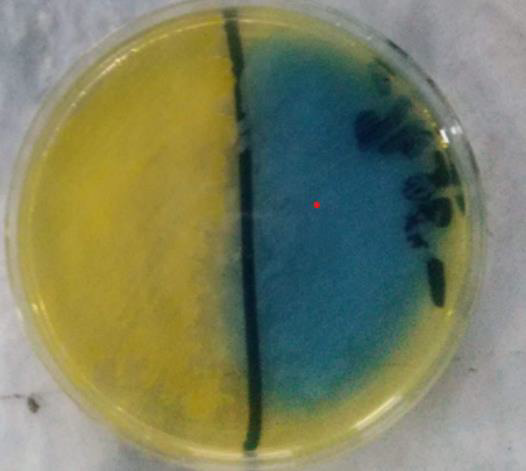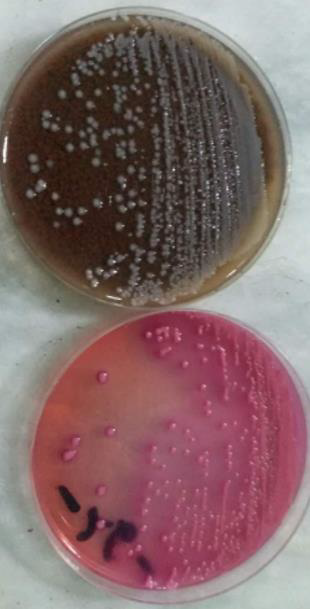ABSTRACT
The presence of bacteria in human life is an absolute necessity that cannot be lived even without some of them. Among the types of this family, there are two types, Salmonella, which causes typhoid fever, and Shigella are always pathogens. According to recent research in Afghanistan, there is no review study to demonstrate the type of bacteria and diagnosis process to renal diseases. Therefore, this is the first study to reveal the normal types in the natural conditions of the body, and cases that can cause diseases, which are two types of bacteria, the E-coli, and Proteus. The E-coli can cause 90% of urinary tract infections or UTIs, especially in women, and the other 10% can be by other types of bacteria. The cause of near to digestion and urinary systems. Proteus Vulgaris is most commonly associated with urinary tract infections among men and women. Based on our work, in which we have been isolated these bacteria, especially E-Coli, drug resistance against a large number of antibiotics have been recorded. Last year, three antibiotics (Imipenem, Fosfomycin, Chloramphenicol), usually sensitive to the majority of patients, were reported at Shinozadeh Hospital in Kabul, Afghanistan. However, Chloramphenicol is not widely prescribed due to its side effects, and recently, in almost 100 patients who have had an antibiogram performed, only Fosfomycin has responded, indicating that patients have unfortunately also used Imipenem before culture.
Introduction
The presence of bacteria in human life is an absolute necessity that cannot be lived even without some of them. one of the important types of bacteria in the Enterobacteriaceae family [1]. Enterobacteriaceae is gram-negative bacteria that are found in the intestines of humans, animals, and nature [1]. According to the pathogenicity study, this family can be divided into three categories, which are the normal flora, opportunists, and pathogenic bacteria [2]. The presence of some species of this family in some parts of the human body is very important and necessary, which in case of extinction, normal physiology of the body will face problems [3]. Furthermore, developmental disorders are sometimes seen due to the unreasonable use of spices, which has caused serious problems in the normal physiology of the body. Therefore, the unreasonable use of antimicrobial drugs can cause a serious problem [4]. Unfortunately, due to the unreasonable use of antimicrobial drugs in developing countries, it is sometimes seen that has caused serious problems in the normal physiology of the body. Among the types of this family, there are two types, Salmonella, which causes typhoid fever, and Shigella are always pathogens [5]. The normal types in the natural conditions of the body, and cases that can cause diseases, which are two types of bacteria, the E-coli, and Proteus. The E-coli can cause 90% of urinary tract infections or UTIs, especially in women, and the other 10% can be by other types of bacteria [6]. The cause of near digestion and urinary systems [7]. Proteus Vulgaris is most commonly associated with urinary tract infections among men and women [8]. According to recent research in Afghanistan, there is no review study to demonstrate the type of bacteria and diagnosis process to renal diseases. Therefore, this is the first study to diagnose Escherichia coli (E-coli) and Proteus Vulgaris among urinary tract infections at shinozadah Hospital, Kabul, Afghanistan.
Method of Collecting Samples to Detect these Two Bacteria
This study is a review of culturing among urinary tract. For the culture of these two bacteria, samples should be collected in sterile equipment and containers, and it is better to inform the patients to wash their genitals with soap and water and collect the middle part of their urine in a sterile manner. Remember, that the method of collecting samples is very important for the detection of microbes has a very important effect. If not collected properly, the result will not be accurate. The study was ethically approved by the SU Ethics Committee (code: 1386-1404).
Culture Process
These two bacteria are usually cultured in one of the selected media such as MaCconkey media, EMB, etc. The Media selection is usually related to the work of the microbiologist. Sample culture is done in the streak method and we can take a result after 24 hours. There are three samples of culture: (Figures 1-3)
Antibiogram
After the culture, if one of these two bacteria is positive, an antibiogram should be done based on standard methods, which is the method of disk diffusion. When we choose a disc, we should be very careful to choose the discs’ bests drugs which means we must know about drug resistance which has been said before. Unfortunately, in tropical countries, drug resistance to antibiotics has increased so much that it may catastrophic after some years.
Results
Based on our work, in which we have been isolated these bacteria, especially E-Coli, drug resistance against a large number of antibiotics have been recorded. Last year, three antibiotics (Imipenem, Fosfomycin, Chloramphenicol), usually sensitive to the majority of patients, were reported at Shinozadeh Hospital in Kabul, Afghanistan. However, Chloramphenicol is not widely prescribed due to its side effects, and recently, in almost 100 patients who have had an antibiogram performed, only Fosfomycin has responded, indicating that patients have unfortunately also used Imipenem before culture.
Recommendation
To prevent the catastrophe of drug resistance, it is suggested that the World Health Organization(WHO) take a serious approach to the non-use of antimicrobial drugs, especially in developing countries, especially in Afghanistan. Otherwise, we catastrophe, anticipate may be more dangerous than we think.
References
- Penalver P, Belén Huerta, Carmen Borge, Rafael Astorga, Rafael Romero, et al. (2005) Antimicrobial activity of five essential oils against origin strains of the Enterobacteriaceae family. Apmis 113(1): 1-6.
- Úbeda J L, Raquel Ausejo, Yahya Dahmani, Maria V Falceto, Adan Usan, et al. (2013) Adverse effects of members of the Enterobacteriaceae family on boar sperm quality. Theriogenology 80(6): 565-570.
- Cursino L, Jan Šmarda, E Chartone Souza, A Nascimento (2002) Recent updated aspects of colicins of Enterobacteriaceae. Brazilian Journal of Microbiology 33(3): 185-195.
- Kunin C M (1993) Resistance to antimicrobial drugs—a worldwide calamity. Annals of internal medicine 118(7): 557-561.
- Fukushima M, K Kakinuma, R Kawaguchi (2002) Phylogenetic analysis of Salmonella, Shigella, and Escherichia coli strains on the basis of the gyrB gene sequence. Journal of clinical microbiology 40(8): 2779-2785.
- Gupta K, D F Sahm, D Mayfield, W E Stamm (2001) Antimicrobial resistance among uropathogens that cause community-acquired urinary tract infections in women: a nationwide analysis. Clinical infectious diseases 33(1): 89-94.
- Zalewska Piątek, B R Piątek (2020) Phage therapy as a novel strategy in the treatment of urinary tract infections caused by E. coli. Antibiotics 9(6): 304.
- Senior B, D Leslie (1986) Rare occurrence of Proteus vulgaris in faeces: a reason for its rare association with urinary tract infections. Journal of medical microbiology 21(2): 139-144.

 Mini Review
Mini Review


